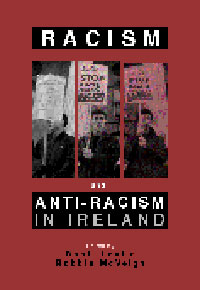Racism and Anti-Racism in Ireland
Ronit and Robbie McVeigh Lentin (editor)
Beyond the Pale Publications: Belfast
2002
1900960168 (pb)
£10.99
vi +248
 In a context where "I'm not racist, but" is still more preface than parody, Ronit Lentin and Robbie McVeigh's challenging volume provides a significant overview of pressing debates for Irish society, and perhaps more importantly, a critique of the terms on which some of those debates are currently being conducted. As the 1990s progressed, substantially increased yet relatively minor flows of migrants, refugees and asylum-seekers to Ireland generated both a raft of depressingly familiar institutional and individual reactions to the economic and cultural consequences of the 'flood', and a robust response from civil society, activists and researchers. This book aims to build on what has become a steady stream of recent publications and provide a central text for students and a wider 'interested' readership. In this it is largely successful, if marginally less so in negotiating a relationship between the types of writing it brings together.
In a context where "I'm not racist, but" is still more preface than parody, Ronit Lentin and Robbie McVeigh's challenging volume provides a significant overview of pressing debates for Irish society, and perhaps more importantly, a critique of the terms on which some of those debates are currently being conducted. As the 1990s progressed, substantially increased yet relatively minor flows of migrants, refugees and asylum-seekers to Ireland generated both a raft of depressingly familiar institutional and individual reactions to the economic and cultural consequences of the 'flood', and a robust response from civil society, activists and researchers. This book aims to build on what has become a steady stream of recent publications and provide a central text for students and a wider 'interested' readership. In this it is largely successful, if marginally less so in negotiating a relationship between the types of writing it brings together.
Standing at almost one-fifth of the book, Lentin and McVeigh's introduction opens with sobering vignettes of racist attacks and political opportunism that has, they argue, elevated concern about immigration to the status of common sense. By way of an instructive overview of established strands in the sociology of racism, the authors work towards a sociology of racism in Ireland, and in doing so, lay the basis for critiquing what have emerged as contemporary social myths. In insisting on the idea of Irish multiracisms - as a matrix of individual and institutional action and inaction - they counter the prevalent discourse in Ireland of racism as a unified state or individual pathology, remedied by an instructive dose of diversity and subsequent open-mindedness. An equally important dimension of this argument is the historicisation of Irish experiences of racism; from the colonial and diasporic racialisation and de-racialisation of Irishness to a consideration of the Others that are 'already and always within the gates'.
By centring the experiences of Jews and Travellers in 'pre-immigration' Ireland, the editors and several contributors challenge the cosy assumption that racism, almost like SARS, arrives with the inbound. The historical ambivalence of emigrant Irish relations with oppressed others in North America and the British Empire also problematises the suggestion that an awareness of past Irish experiences provides a direct font of anti-racist empathy. Fifteen essays - divided into porous sections entitled Racism in Ireland, Perspectives, and Anti racism - build on this critique and tease out forms of discrimination and the shifting intersection of ethnicity, gender and class, through writing that unevenly integrates narratives of personal experience and activism with analytical discourses.
In a highly globalised country that still possesses a national public sphere, a thorough consideration of how Irish media has constructed the 'immigration debate' is clearly the work of a separate publication. Nevertheless, Patrick Guerin - in engaging with the sensationalism of certain news agendas - contributes a valuable critique of the assumptions that have guided opinion polls, and Elisa Joy White begins the complex task of questioning the globalised index of racialised images now immanent in Irish representations of Blackness. There are moments, in some of the pieces, where the enthusiasm for critique in an evolving field of research strays into interpretative indulgence. For example, Joy White's aside that Nelson Mandela could be viewed as a 'black baby' (racialised symbol of missionary charity) that the Irish public allowed to grow up jars with the history of committed Irish anti-apartheid work alluded to by McVeigh in an essay in the same volume.
The concluding section is excellent, in particular McVeigh's critical history of Irish anti-racism that culminates in a distillation of future objectives that merit far more treatment than they receive in conclusion. Similarly, Lentin's critique of drifts towards an uncritical multiculturalism, where a recognition of difference is made possible only by disavowing the heterogeneity and incoherence of the Irish we, has rightly been influential since it was first published in Sociological Research Online (http://www.socresonline.org.uk/5/4/lentin.html ). This publication aims to plug a theoretical and pedagogical gap, and such is its strength in the former that lingering theoretical gaps are less shortcomings than clear indicators of crucial future research. Its pedagogical function remains an open question; while surely challenging for the university students it targets, its realistic transition to pedagogy beyond the seminar room is likely to be dependent on its skilful mediation. But that is hardly news.
Overall, this publication is a stimulating critique of and formidable challenge to the increasing normalisation of racism in Irish society, and its urgency stands in solidarity with the very real oppressions it documents and confronts.
Gavan Titley
University of Helsinki

